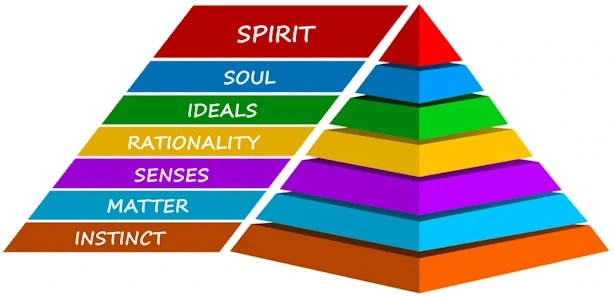
It is a common assumption that in order to be considered “spiritual”, one must adhere to a strict set of principles and practices. If the objective is to achieve ascension or enlightenment, it is clear that a high level of commitment and discipline is required.
However, what about those who are simply seeking a happier and more fulfilling life through spirituality? One might inquire whether the same degree of discipline should be applied. The value placed on discipline in our society is considerable; however, it is not clear whether this value is beneficial or detrimental. At what point does the application of discipline result in a net negative outcome?
It is a fallacious argument to suggest that one must adhere to a vegetarian diet in order to pursue spiritual growth. It is unclear where the assertion that one can only listen to relaxing music if one is spiritual is documented. A few weeks ago, I was informed by an acquaintance that they are currently abstaining from all forms of sugar due to their newly adopted spiritual beliefs. I inquired as to the rationale behind the zero-sugar intake, given the individual’s spiritual pursuits. The response I received was somewhat perplexing, as though I had not asked a reasonable question. I did not receive a response, as the individual turned away to engage in a conversation with another person, thereby terminating the interaction.
During the same week, I took part in a group meditation session on the topic of “indulgences”. In the meditation, participants were instructed to identify an indulgence they engage in. As one might expect, a plethora of potential indulgences came to mind, including reading a good novel, eating a bag of chips, drinking a glass of wine, enjoying a cup of coffee, and consuming chocolate. The list is quite extensive. The mere recollection of this experience elicited a smile. It is the seemingly insignificant aspects of life that can evoke a profound sense of joy.
While I was engaged in the act of smiling and experiencing a general sense of well-being, the meditation underwent a notable transition. I was abruptly prompted to envision myself overindulging in my chosen “indulgence”. To illustrate, if chocolate is the chosen indulgence, the individual is encouraged to consume a substantial quantity of the item in question. At this juncture, I began to experience some difficulty in maintaining my focus during the meditation. I permit myself a number of indulgences on the basis that life should be enjoyed. Furthermore, I have found from personal experience that when I allow myself these indulgences and feel positive about them, I never feel the need to overindulge.
Ultimately, I opted to cease involvement in this specific meditation practice due to my preference not to engage in the visualization of excessive indulgence. It was not a practice that I found to be in alignment with my personal values and sensibilities. Nevertheless, a meditation of this nature may prove beneficial for those struggling with a genuine addiction, particularly if the individual is unable to cease their excessive consumption. The key term here is “over” indulging. There is a significant distinction between a life-enhancing indulgence and a harmful overindulgence.
It is crucial to comprehend that a perspective which deems all indulgences to be detrimental is an inherently imbalanced approach to spirituality.
It has become evident that there are those who believe that the restriction of pleasurable activities is a pathway to spiritual growth. This belief is a fundamental tenet of numerous religious traditions, which espouse the idea that discipline and suffering are prerequisites for attaining divine enlightenment.
It is my contention that self-denial or restriction does not enhance or diminish spiritual capacity, nor does it facilitate spiritual progress. It is my conviction that the purpose of our existence is to fully engage with the experiences of life, rather than to deliberately seek to diminish the joy that these experiences offer. This is particularly relevant when one has chosen to pursue an otherworldly path.
I adhere to the principle of maintaining equilibrium in all aspects of my life. To illustrate, on occasion I engage with heavy metal music. Initially, I was hesitant to divulge this aspect of my personal beliefs because I was aware that some individuals with spiritual inclinations might view this form of indulgence with disapproval. This is precisely why I have chosen to disseminate this particular piece of information. I am aware that I derive pleasure from this activity and, as a result, I am disinclined to disavow this aspect of my identity. I am sufficiently self-accepting and self-loving to acknowledge this indulgence and to embrace it as a positive aspect of my personality. Does this make me less spiritual? Such an assertion is demonstrably false. This merely distinguishes me as an individual who is capable of appreciating spirituality in all aspects of life.
Does the consumption of a good steak result in a loss of emotional stability and clarity of thought? Such a conclusion would be erroneous. However, I do acknowledge the cow as a source of gratitude. Does allowing anger or frustration to manifest in one’s demeanor render one less loving? Such a proposition is untenable. Humans are complex beings with a vast spectrum of emotions that should not be simplistically categorized as “good” or “bad”. One need not suppress the so-called “bad” emotions simply because they are not aligned with the conventional view of what it means to be a spiritual person. Regardless of how one lives one’s life, at the core, we are all celestial beings.
Those who do not pursue enlightenment may still benefit from a balanced approach to their otherworldly journey. One should refrain from self-criticism merely due to the consumption of two cookies instead of one, or the enjoyment of a glass of wine. One’s spiritual orientation is not diminished by an inclination towards activities such as dancing in a nightclub or reading a good thriller.
In my own conduct, I endeavor to adhere to two fundamental principles, which I consider to be of paramount importance:
1. Do no harm to any individual.
2. It is my intention to disseminate benevolence and illumination wherever I may go. All other aspects of life are open to debate and available for personal experience. The decision is mine, or yours, to make.
In the context of spiritual practice, it is important to maintain a balance between introspection and enjoyment. While it is essential to engage in practices that align with one’s spiritual beliefs, it is also crucial to embrace activities that bring joy and fulfillment. One might posit that the concept of spirituality is not constrained by the limitations that are commonly ascribed to it. One must refrain from making judgments. Such actions do not facilitate one’s highest level of personal growth and development. Maintaining equilibrium is an optimal approach to existence.
ARE YOU APOLLONIAN OR DIONYSIAN?
Have you ever heard of the Apollonian and Dionysian concepts? They were developed by Friedrich Nietzsche and represent two opposing principles that influenced the art and culture of ancient Greece. The Apollonian spirit is all about order, rationality, and ideal beauty. The Dionysian spirit, on the other hand, is about embracing chaos, following your instincts, and enjoying the intoxicating joy of life. Both of these principles are ways of responding to the pain of living. The Dionysian deals with pain through intoxication, celebrating life, and enjoying sensory pleasure. The Apollonian, on the other hand, seeks to find meaning and purpose in this suffering through rational reflection, art, and sublimation. Which mode of existence resonates with you the most?
Instructions:
Select only one answer for each question (A or D).
Answer all questions, 5 in total.
1. Life is wonderful, you just have to learn how to enjoy it!
2. Business before pleasure. Are you really sure about this?
3. Do you easily get carried away by feelings and emotions?
4. An unexpected economic opportunity arises. How do you react?
5. What kind of relationship do you have with order and discipline?
Count the number of responses for each type, A and D, then refer to the corresponding profile.
A=5 / D=0: You are a direct descendant of Apollo!
A=4 / D=1: You are strongly Apollonian
A=3 / D=2: You are Apollonian with Dionysian tendencies
A=2 / D=3: You are Dionysian but without excess
A=1 / D=4: You are a Dionysus wannabe!
A=0 / D=5: You are Dionysus himself!






In my opinion enjoying life’s pleasures, which aren’t that many after all, is not an issue. The thing that makes a difference is the awareness of one’s limitations and that happiness is to be sought in other things.